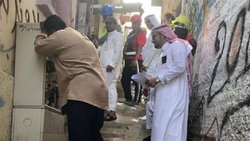 Saudi activists have expressed serious concern over the spread of the novel coronavirus in some neighborhoods of the holy city of Mecca, emphasizing that the slums are hotspots for the severe outbreak as they are densely-populated and suffer from unsanitary conditions and weak health infrastructure.
Saudi activists have expressed serious concern over the spread of the novel coronavirus in some neighborhoods of the holy city of Mecca, emphasizing that the slums are hotspots for the severe outbreak as they are densely-populated and suffer from unsanitary conditions and weak health infrastructure. RNA - The London-based and Arabic-language Nabaa television news network, citing the activists, reported that low-income residents of al-Nakasa and Housh Bakr districts, who are mostly Bangladeshi and Burmese nationals, are highly at risk to contract the virus.
The Nakasa district is notorious for its poor living conditions. Garbage can be seen piling up all over the area, while the area also has no sewage network.
The district’s residents have, nevertheless, adapted to living in such squalid conditions.
Many foreign nationals have reportedly taken advantage of the chaotic conditions as well as lack of monitoring by authorities, and sell many dubious items, including various herbal cures not certified by medical officials.
Saudi Arabia is the worst-hit country by the pandemic among the six Persian Gulf Cooperation Council (GCC) nations, with 29 deaths amid 2,179 cases reported as of Saturday.
It has already halted international flights, suspended the year-round Umrah pilgrimage, closed most public places, and heavily restricted internal movement.
On Tuesday, the Minister for Hajj and Umrah, Mohammed Saleh Benten, asked Muslims on state TV to defer preparations for the annual Hajj pilgrimage, scheduled in late July, due to the coronavirus pandemic.
The eastern oil-producing region of Qatif, where the kingdom's first coronavirus cases were reported, has been on lockdown for nearly four weeks.
*****
112/940